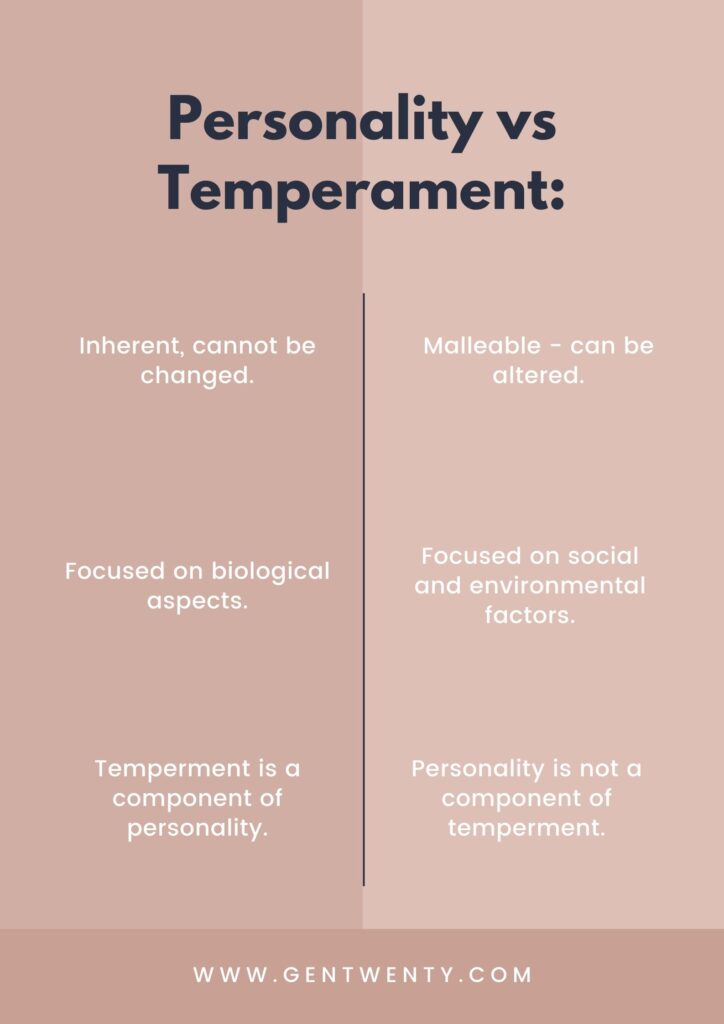[ad_1]
Wondering what the difference are between personality vs temperament? Let’s dive deep into this topic and find compare the two.
Whenever you describe a person’s behaviour, what word would you use to describe their characteristics? Would it be their “personality?” Or rather, would it be their “temperament?”
There are plenty of arguments about the differences between these two terms. Although they are used interchangeably, it’s important to distinguish such definitions.
First off, let’s define the concepts individually: According to the definition by Oxford dictionary, temperament refers to a person’s nature and behavior. Although this definition may seem broad at first, it hints towards two important concepts: a person’s innate nature, and the person’s reactions to certain challenges and situations.

Temperament:
When combining these two aspects together, psychologists conclude that temperament refers to an individual’s behavioral traits based on their own genetics and other biological factors.
Scientists categorized temperament into four main components: Sanguine, Choleric, Phlegmatic, and Melancholic. Let’s take a look at each:
Sanguine describes individuals who are extroverted and sociable.
These individuals love to talk about different topics, and often exhibit optimism. People with sanguine traits have lots of energy and do not react as strongly to emotional situations. However, they tend to also have highly addictive and impulsive behaviors, such as engaging in risky activities.
Choleric temperament is dominant and assertive.
These individuals are goal-oriented, and are characterized by their need to achieve. They are natural-born leaders, and have a need to control or dominate. As a result, people with choleric temperaments often enjoy being around others who engage with them intellectually.
However, people often do not enjoy being around choleric temperaments, due to their need to dominate.
People with phlegmatic temperaments can often be described by others as “chill,” “laid-back” and “easy-going.”
Hence, they tend to be more empathetic towards their peers when facing different situations. But when it comes to disagreements, phlegmatic temperaments dislike conflict and try to avoid it altogether.
Melancholic temperaments are often known to be emotional, thoughtful and sensitive.
They tend to feel their emotions deeply and are detail-oriented; they ensure that they complete their tasks to the best of their abilities. So, they may exhibit an overly critical attitude at times.
Overall, temperament is based on an individual’s biology, and somehow hints towards an individual’s personality, but not fully. Here is a temperament quiz to help you figure out your own temperament.
Personality
According to the American Psychological Association (APA), the personality of an individual refers to the characteristics and behavior which affects an individual’s life, including their major traits and their self-concept.
Instead of focusing on the biological aspects, personality focuses on the social and environmental factors of individual differences. An individual’s core personality tends to not change over their lifetime, although other new patterns emerge and develop.
As a result, personality is described to be more of a biopsychological or biosocial definition of an individual’s behaviour.
What are the differences between the two?
Other than the focus on an individual’s biological innate characteristics and the individual’s psychosocial factors, there are other differences. Here are some of them:
Temperament is often part of an individual’s personality, but not vice versa
According to researchers, temperament is a component of an individual’s personality. Having a temperament allows us to react to the world in a certain manner, and form our own opinions and beliefs, which constitute our personality. That’s why ‘temperament’ is often referred to as the ‘foundation of someone’s personality.’
Temperament is difficult to change
Since temperament refers to our innate traits, changing our temperament often becomes more difficult. We are biologically programmed with our temperament, and often our temperament can be a reflection of the balance of chemicals within our brain based on our surroundings.
Temperament is more narrowly defined
Personality consists of a broad category outlining the individual’s learned habits and biological hereditary. Temperament more so outlines our natural tendency, and tends to be visible in our early childhood years. There is still no exact or clear definition of personality, as it involves a variety of complex systems working together.
Temperament cannot be learned or acquired from others
After all, temperament refers to how an individual is biologically programmed. So, temperament remains consistent with an individual throughout their lives.
Temperament often describes an individual’s reactions or sensitivities
One of the traits of temperament is sensitivity. People who are programmed to be more sensitive tend to react strongly to external factors, such as lights, sound, smell or taste.
For example, some children are programmed to be hypersensitive, which often means that they want to avoid strong sensory stimulation. These children may have a migraine when they’re in spaces with too much light. This is due to the ongoing stimuli of the external factors around them.
Mood is another trait of temperament
Mood may first be perceived as a reflection of our personality. But it’s actually a component of assessing an individual’s temperament.
Some individuals are programmed to be happier individuals, such as those who have a sanguine temperament. However, other individuals may naturally possess a more negative mood.
Temperament is ‘nurture,’ whereas personality is ‘nature’
Temperament cannot be changed by the environment around you. But personality can be changed by environmental influences such environmental actors and economic conditions.
Personality can be affected by the surroundings you grew up in and your current friend’s group. These can alter a person’s personality so that your personality is a reflection of what’s around you.

How are Personality and Temperament Connected?
Sure, personality and temperament influences an individual’s actions, however, there’s more factors that are at play than the two. Here are some of the ways that temperament and personality both are connected:
There is a connection between personality, temperament and emotional intelligence
Studies show that temperament, family environment and childhood experiences can correlate with emotional intelligence.
Depending on the individual’s temperament, they can be greatly influenced by the environment and their own needs. As a result, an individual’s own biological programming, combined with their interactions with the environment, can change the way they respond to a particular situation.
A child’s temperament can alter how they cope in various emotional states their emotional reactivity throughout life. What we learn in childhood can alter both our initial reaction to something and the prevailing mood. This can be based in a person’s temperament but further factors can alter how we learn to cope as adults.
Personality and Temperament are often broken down into the “Big Five” Traits
The big five personality traits include openness, conscientiousness, extraversion, agreeableness, and neuroticism.
The Big Five personality traits, also known as the Five-Factor Model (FFM), are a widely accepted framework in psychology for understanding human personality. These traits represent broad dimensions of personality that cover a range of characteristics:
- Openness to Experience: This trait reflects a person’s willingness to try new things, their imagination, and their appreciation for art, beauty, and unconventional ideas. Individuals high in openness tend to be creative, curious, and open-minded, while those low in openness may be more traditional and prefer routine.
- Conscientiousness: This trait refers to the degree of organization, goal-orientation, and self-discipline a person has. Highly conscientious individuals are often reliable, diligent, and responsible, while those low in conscientiousness may be more impulsive and spontaneous.
- Extraversion: Extraversion involves the extent to which a person is outgoing, sociable, and assertive. Extraverts tend to seek out social interactions, enjoy being the center of attention, and gain energy from being around others. Introverts, on the other hand, may prefer solitude or smaller group settings, and they may find large social gatherings draining.
- Agreeableness: This trait reflects a person’s level of kindness, cooperativeness, and empathy. Individuals high in agreeableness tend to be warm, considerate, and compassionate, while those low in agreeableness may be more competitive or skeptical.
- Neuroticism (or Emotional Stability): Neuroticism refers to the degree of emotional stability and resilience a person has. Highly neurotic individuals are more prone to experiencing negative emotions like anxiety, sadness, and anger, and they may be more sensitive to stressors. People low in neuroticism tend to be more emotionally stable, calm, and resilient.
It’s important to note that these traits are not binary categories, but rather exist on a continuum. Most people exhibit a mix of these traits, and they can change over time due to various factors, including life experiences and personal development.
According to many scientists and personality theorists, there is a correlation between temperament and the development of conscientiousness. Temperament often refers to our own state of self-control, which affects attention span, shift, and activation control.
This means that temperament can affect a person’s level of discipline, organization, and persistence, which are part of the five personality traits.
Extraversion or Introversion has a genetic component
Studies also have shown that extraversion and introversion have a genetic component linked to both traits. Hence, they can be related to our temperament as well.
For example, studies have shown that there tends to be a relationship between the level of dopamine in the brain and the level of extraversion or introversion which an individual exhibits.
Research shows that extraversion is linked to genetic polymorphisms in the dopamine D4 receptor. As a result, an individual’s level of extraversion or introversion can be detected at birth, or in early childhood via specific genes, which indicates the importance of hereditary factors

Overall: Our temperament and personality influences who we are as individuals.
Our temperament and personality can manifest itself in different ways, whether that is with the way we perceive situations, solve challenges, and work towards goals.
When we’re communicating with others, our personality and temperament play a big role in our preferred method of interaction. For example, some of us may prefer to be more direct with others, whereas others may prefer to communicate in more of an indirect, non-verbal manner.
Our temperament outlines the personality characteristics which are biological: They are programmed during birth and exemplified throughout early childhood. But our personality is affected by the various societal factors around us, such as abiding to or conforming to social norms.
Overall, both characteristics are important as they are part of us and our behavior. We cannot act a certain way without the other. So that’s why it’s important to embrace who we are.
More Posts To Read on Self-Development:
About the Author
[ad_2]
gentwenty.com







